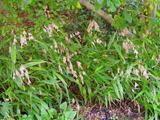Native Plants

Q. Who is Mr. Smarty Plants?
A: There are those who suspect Wildflower Center volunteers are the culpable and capable culprits. Yet, others think staff members play some, albeit small, role. You can torture us with your plant questions, but we will never reveal the Green Guru's secret identity.
Did you know you can access the Native Plant Information Network with your web-enabled smartphone?
Ask Mr. Smarty Plants is a free service provided by the staff and volunteers at the Lady Bird Johnson Wildflower Center.

rate this answer
Saturday - January 05, 2008
From: San Antonio, TX
Region: Southwest
Topic: Grasses or Grass-like
Title: Post freeze care for Texas native grasses
Answered by: Barbara Medford
QUESTION:
Can you tell me the best post-freeze care for Tx native grasses in my garden: lindheimer muhly, gulf muhly, inland sea oats. Mexican feather grass. Do I cut them back? Burn them? Leave them alone? Thank you.ANSWER:
The key word in your question is "native." When you select plants that are already adapted to an area, it cuts down on the maintenance that has to be done. Muhlenbergia lindheimeri (Lindheimer's muhly), Muhlenbergia capillaris (hairawn muhly), Chasmanthium latifolium (Inland sea oats), and Nassella tenuissima (finestem needlegrass) are all native to this area, and will suffer little, if any, from frost. With all grasses, the main concern in trimming is keeping them tidy. It's probably best to leave any dead stems on the grasses until the chances of frost are well over, as the overhanging grasses will help to protect the green part of the plant from an excessive freeze. Then, you might cut about 1/3 of the plant back, and thoroughly rake out any dead or cut ends. Keeping the dead grasses out of the plants is important both to appearance and because the dry material can be a burn hazard. Obviously, we do not advise that you burn anything, especially now with the dry weather in Central Texas, along with high winds.
More Grasses or Grass-like Questions
Plants to grow in shady sand in Florida
March 31, 2013 - We live in central Florida (directly between Orlando and Tampa). Our yard is mostly sand for soil and difficult parts in shade almost all day from large trees. What ground cover (grass) and hedges can...
view the full question and answer
Cause of yellowing buffalo grass (Bouteloua dactyloides)
June 07, 2008 - We are getting large yellow areas in our buffalo grass lawn and think this is probably due to grub worms. Are grub worms the likely culprit and if so, what is the best way to get rid of them? We don...
view the full question and answer
Ornamental bunch grasses to grow under live oak
June 25, 2007 - I love live oak trees and have one in the back yard that is growing nicely. I don't know if it's the shade or the leaf and acorn droppings that won't allow the grass to grow underneath it. Around...
view the full question and answer
Native Indiangrass as a hedge
December 13, 2009 - Hi Mr. Smarty Plants,
I would like to create a grass hedge as a foundation planting for a portion of our garden. One side of the planting is a concrete sidewalk to our garden shed, the other side wil...
view the full question and answer
Growing native grasses in containeers in Illinois
May 16, 2007 - Hi.
How well would native grasses grow in container gardens in Illinois? What soil would you suggest?
Thanks.
view the full question and answer
| Support the Wildflower Center by Donating Online or Becoming a Member today. |

